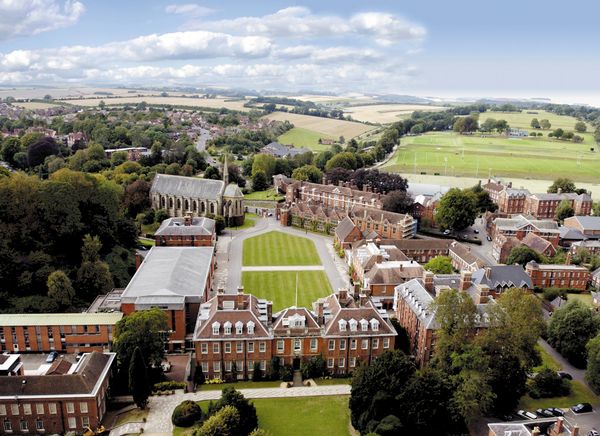Last week, we published a post answering a question a lot of soon-to-be expats ask: “So, what exactly is International Baccalaureate?”
They ask the question because most international schools in Europe follow the international baccalaureate curriculum, a course of study with which a lot of people – particularly Americans – aren’t familiar. It turns out that IB is more of a philosophy and holistic approach to education than conventional course of study. But, what is it like to go through an IB program? To answer that question, we turned to our long-time friends, the Rendells, whose son Tom went through the IB program at a private school in Wiltshire, about 50 miles west of London.
Tom and his mother Sue did a Q&A, giving us their observations and opinions about international baccalaureate in the context of expats (Americans and Brits) and their kids heading off to international schools.
A little background: We met the Rendells when we were all assigned to Izmir, Turkey. Tom and Jonathan, his brother, grew up with my daughter Lucy and attended Turkish pre-school and primary school. Thomas was intently focused on academics – especially science – when he was still a small boy, so I know him to be a serious young man who is the equal for any educational challenge. At age 6 while my wife was watching the Rendell boys for a long weekend, Thomas peered into the oven and asked, “Miss Cheryl, what makes the cake rise?”
 Dispatches Europe: Where was your IB program? At a private school, or public?
Dispatches Europe: Where was your IB program? At a private school, or public?
Thomas: I studied the IB at Marlborough College, a private school in Wiltshire.
Was this an established IB program, or new?
The program wasn’t new, but had been established recently. I was part of the second cohort of students to take the course at this school.
Thomas, did you have to apply to get in, or were you accepted based on your grades? Was there an interview?
Preceding college, most students in the UK take The General Certificate of Secondary Education (The GCSE is a rigorous, internationally recognized certification awarded in a specified subject, generally taken in a number of subjects by students 11 years old to 16 years old). Depending on the school, and academic ability of the individual, students take up to 11 subjects. Grades considered “passes'” for GCSEs are A* – C, followed D, E and U for poorer scores. The conventional program for academic colleges is A levels, which normally requires a student to pass at least 5 GCSEs, but this does vary college to college. For the IB students, the requirements were tougher. I can’t remember exactly, but I am pretty certain I was required to have a minimum of 6 GCSEs, grades B – A*, and it had to include chemistry, biology, a foreign language (I took French) and a humanities subject (history for me). There was no formal interview process, but there were separate IB open days I had to attend.
Do you feel like your IB program prepared you well for university?
Yes. Compared to all my peers taking A levels or other alternatives, my IB classmates and I unanimously agree that we went into university with a noticeable advantage. Obviously this varies, and a dedicated, hardworking student from any background can excel at university. But the IB’s assesement style is noticeably tended towards university style reports than school-homework styles. The use of citation, referencing the sources of your information, was introduced to me during the IB whereas my non-IB friends first encountered this at university.
The use of statistical analysis to test the strength of data is something fundamental to any science degree. Again, the IB introduced the concept of this to me during my college years, when most students don’t encounter this until starting university. The intensity of the workload for the IB I would say is far greater than anything I have experienced at university. A student who completes the IB successfully, in my opinion, is well suited for university practices and pressures.
Were your teachers up to snuff?
Mine were, but I was fortunate to take the IB at one of the best private schools in the UK. None of my teachers was specific to the IB. They all also taught the A level students, but the caliber of the teachers at my school was very high. I initially began the program at a state school, and although having a good local reputation, there was substantial difference between the teaching standards.
How much did it cost to take your final IB test? Did you have to go before your teacher or a panel for your Theory of Knowledge?
At the time of my attending, the college I attended had annual fees of $35,000 for all pupils (I must add here that my parents did not pay these fees; 9 other classmates and I attended Marlborough College on a scholarship-like agreement, which totally covered the school fees). However, any student taking the IB at a state-funded school in the UK does so totally free of charge, I think. Although possibly a small fee to take the exams. I can’t remember! For my (Theory of Knowledge) I don’t think I did. I just wrote my essay and submitted it.
What was the best and worst parts of your IB experience? Did you recommend it to your (younger) brother Jonathan?
I enjoyed the international aspect of it for the humanities subjects. I had always studied British history or English literature before. However, with the IB we focused on literature from around the world in our literature classes, and studied the Cold War USA/Europe in history which I had never covered before. That said, possibly my worst experience was having to do my extended essay on a history topic. I think there was some confusion around the organization of the EE and I wasn’t able to do a science one, and writing 4,000 words on (Lyndon) Johnson’s presidency wasn’t ideal!
I did recommend it to Jonathan, but he chose not to follow the program. When recommending it I did make it very clear that if he did do it, he would have to work hard at it!
How important an element is personality in all this? What sort of student does best in the IB program, in your opinion? Do you have to be a self-starter and motivated to succeed? Or are the teachers always monitoring progress … or lack of?
Personality plays a major role, and personal ability is crucial for the IB. The majority of us in my relatively small classes became very close friends. I finished the IB five years ago now, and I am still close with a fair few of my classmates, despite us all being in different countries at the minute! Self-motivation is essential; I will admit I occasionally struggle with this aspect. I need a deadline to stress myself into getting work done and often left things until the last minute, and despite doing well in my Bsc. now, my overall grade for the IB was quite mediocre because of it.
In contrast, Lorenzo (a classmate) was taking higher level mathematics, chemistry and physics and standard level English, history and Latin. He dedicated his entire life to working and came out with 45 points, the highest amount possible, and is now studying a masters degree in pure physics at Cambridge University. The downside for him was that he was maybe too dedicated to his work.
The teachers do keep tabs, but they wouldn’t chase you. If you had a big piece of work due, it was entirely at your own discretion to get it in on time; there were no reminders or extensions. However, if ever anyone was in need of help, they were more than happy to offer support to hard working students.
So, are all the stories true about IB being all consuming for kids?
Honestly it isn’t so bad. There are a lot of horror stories out there about the IB, because it does require a fair amount of work. As long as you know the best way to divide your time between subjects (you work it out pretty quick), and make sure to make time to have some time off every week, it’s not a burden. If it’s taught well and with a decent bunch of students (which I’m sure Lale will have because I’ve never met a bad person from an International School) then it’s actually a fair amount of fun!
What do Sue and Mark think about IB?
They both liked the idea of it. It was actually Mum who encouraged me to do it in the first place; I wasn’t sure what I wanted to do after college, but I did know I wanted to go to university, so the only option was to follow some form of academic path and the IB gave me the broadest option.
We asked Sue Rendell for the mom’s perspective, and here’s what she said:
So IB in the UK still mainly stands for irritable bowel! But some schools are embracing it. Thomas did it, and, yes, I definitely think it helped him with his (university) placement as he got an offer with no interview needed, although he did travel for a year and was given his place based on his IB results rather than his GCSEs.
IB isn’t offered in every school here, and I think it is well suited to kids who do well in exam situations and are prepared to put in the extra work needed like volunteering etc. Jonathan has done A levels, but doesn’t at this point know what he wants to do, so has taken a broad range of subjects like English literature, Spanish and biology as well as an AS in history … at the moment he is still studying so I can’t compare results, but of the two boys Jonathan’s higher education has been an easier path than Thomas’s IB.
Co-CEO of Dispatches Europe. A former military reporter, I'm a serial expat who has lived in France, Turkey, Germany and the Netherlands.
















